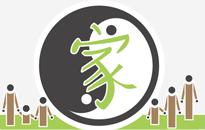Family doctors for parents & children
HOLISTIC
FAMILY
MEDICINE
Qigong and Taiji
„Qi“ in Chinese means energy for life. “Gong” means work, exercise. Qigong is the health sport deeply rooted in the Chinese tradition which strengthens life energy, Qi, by intensive work on the breathing. “Qigong” can be understood as “intensive exercises with Qi” where a continuous free flow of Qi is the most important.
“Tai” stands for the superlative such as very, most or best. “Ji” means extreme such as the polarities. Taiji, shortened from “Taiji Qua,” which is orginally a form of martial arts using mainly the hands and the fists (Quan). In modern times, some of the best known movements have been taken over and developed into a kind of popular sport. Nowadays, Taiji is practised mostly as an exercise for health. It is very popular in China and is becoming increasingly well known all over the world.
Comparing the two, the exercise forms of Qigong are mainly static whereas Taiji shows series of complicated movements. However, breathing technique is important in both, just as in Yoga and in meditation. People of ancient cultures have always realised the importance of breathing for health. The same concept underlies the application of physiotherapy of breathing for asthma patients. This body training is more important in improving lung functions in the long run than any medication.
Qigong in its quieter style is meditative and strengthens also the concentration besides breathing technique. Taiji as martial arts trains the strength of the body and its ability to react. It is sometimes called “Qigong in movement”. The regular practice of one or the other as a hobby helps to keep you healthy.


